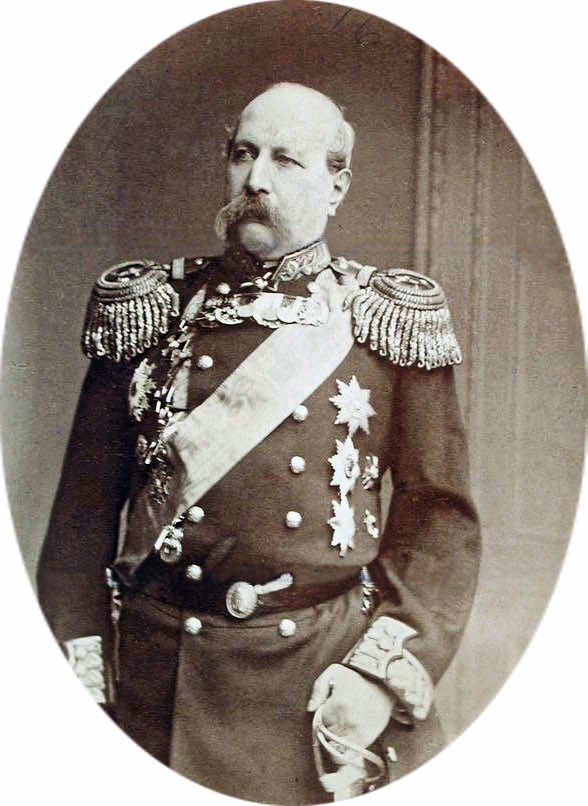The first Azerbaijani vice-admiral Ibrahim bey Aslanbeyov
 Ibrahim bey Allahverdi bey oglu Aslanbekov was born on September 10, 1822 in the city of Baku. In 1837 he graduated with honors (with a marble plaque of honor) from the Naval Cadet Corps (St. Petersburg). He served on the frigates "Proserpina" and "Alexander Nevsky" in the Baltic Sea. Midshipman Aslanbekov for two years took part in the exercises conducted near Dagerord on the warship "Emperor Peter I".
Ibrahim bey Allahverdi bey oglu Aslanbekov was born on September 10, 1822 in the city of Baku. In 1837 he graduated with honors (with a marble plaque of honor) from the Naval Cadet Corps (St. Petersburg). He served on the frigates "Proserpina" and "Alexander Nevsky" in the Baltic Sea. Midshipman Aslanbekov for two years took part in the exercises conducted near Dagerord on the warship "Emperor Peter I".
In 1842, Ibrahim bek, having graduated from the officer class of the Naval School, sailed on the military reconnaissance ships of the Black Sea Fleet and took part in the clashes that took place on the eastern shores of the Black Sea.
In 1854, Lieutenant Aslanbekov, who commanded the Elbrus warship, went to sea four times (June 30, July 7, August 3 and 6) to destroy enemy merchant ships, and in August he commanded a mobile battery formed from landing ship guns. For this service, he was promoted to the rank of Lieutenant Commander. From September 13 of the same year until the end of the war he was in the Sevastopol garrison, and on August 27, when repulsing the last attack, he received a shell shock. After the Eastern War, he was the commander of the 36th naval crew at the port of Nikolaev.
In 1860-1861, Aslanbekov sailed the Mediterranean Sea as the commander of the Sokol screw corvette and brought this corvette to Kronstadt. In 1863, Ibrahim bek, who returned to the city of Nikolaev on the same corvette, was appointed commander of the Retvizan ship (1865–1868) two years later. For some time he was the chief of staff of the armored squadron of the famous Vice Admiral G. I. Butakov.
In 1869-1872 he was chairman of the commissions convened to study issues of national importance. Ibrahim bey was sent to Estonia and became a member of the commissions for the development of merchant shipping and shipbuilding.
In 1872, a great celebration took place on the occasion of the centenary of the birth of Peter I. On this occasion, he was entrusted with accompanying Peter's boat to Moscow for the First All-Russian Polytechnic Exhibition.
On January 1, 1878, when he was awarded the rank of rear admiral, Ibrahim bey Aslanbekov was the head of the 8th naval crew.
In 1879-1882, Ibrahim bey with the crew of the ship made a round-the-world trip. He was appointed head of the Pacific Ocean squadron as part of the first armored cruisers with an iron hull “Minin”, “Knyaz Pozharsky”, “Duke of Edinburgh”, “Asia”, “Africa” and sail-steam clippers. Aslanbekov is the initiator of the use of fast cruisers in the ocean and the "flying squadron" in the army.
Admiral Ibrahim bey Aslanbekov sailed around the islands of the Pacific Ocean and even visited the small islands of Polynesia. From the materials of the personal file of Ibrahim bey Aslanbekov, it is clear that he enjoyed great respect among his colleagues and subordinates.
In 1884 he was appointed junior flagship of the Baltic Fleet. On September 22, 1887, for his invaluable service in the Navy, he was awarded the rank of Vice Admiral.
Admiral Ibragim bey Aslanbekov, who gave the fleet more than 50 years of his life, was awarded the highest orders of Russia and foreign states. He was awarded the orders of the Cross of Takov (Serbia 1879), St. Vladimir (Russia 1854), St. Stanislav 1st degree (Russia 1881), St. Anna 1st degree (Russia 1883), White Eagle (Russia 1888), Rising Sun (Japan 1882), Kalakaua I 2nd degree (Hawaii 1882).
In 1881, Admiral Aslanbekov, who took part in the coronation ceremony of Emperor Alexander III, was presented with a saber and a cash reward in the amount of an annual salary.
Starting from the sixties of the XIX century, Admiral Aslanbekov published a number of scientific publicist articles in the journal “Marine Collection”: “Sailing of the Sokol corvette from the Mediterranean Sea to Kronstadt” (1861); "Admiral Pavel Stepanovich Nakhimov" (Biographical sketch, 1868), "Admiral Alexei Samuilovich Greig" (1873), "Admiral Alexander Ivanovich Panfilov" (1874), "Speech on the celebration of the 50th anniversary of the Naval Academy" (1877), "Information about different places visited by Rear Admiral Aslanbekov" (1881), and others.
Ibrahim bey Aslanbekov died on December 7, 1900, in St. Petersburg.
Recommended literature:
- Nəzirli, Şəmistan Əmiraslan oğlu. General Əli Ağa Şıxlinski və silahdaşları: hərb tarixindən araşdırmalar /Ş. Nəzirli; elmi məsləhətçi M. Süleymanov. - Bakı: Şərq-Qərb, 2012. – 494 s.
- Nəzirli, Şəmistan Əmiraslan oğlu. Arxivlərin sirri açılır [Mətn] /Ş. Nəzirli; Rəyçi: Ç. Məmmədov; Red.: R. Faxralı; Buraxılışa məsul: B.Süleyman; Rəssam: Ədalət Həsənov. - Bakı: Elm, 1999. - 414 s.
- Мусаев, Гидаят Мамед оглу. Забытый адмирал /Г. Мусаев. - Севастополь: Дельта, 2014. - 173 с.